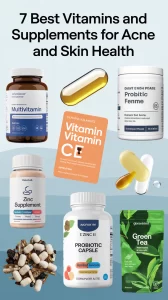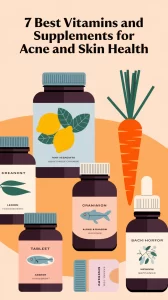Achieving clear, healthy skin is a common goal, and the right vitamins and supplements can play a significant role in your skincare routine. If you’re battling acne or looking to boost your skin health, consider incorporating these seven essential nutrients into your regimen.

1. Vitamin A
Vitamin A is crucial for skin repair and maintenance. It helps reduce acne by preventing clogged pores and promoting cell turnover. You can find it in foods like sweet potatoes, carrots, and spinach, or as a supplement in the form of retinol.
2. Vitamin D
Vitamin D plays a vital role in skin health and immune function. A deficiency can lead to skin problems, including acne. Spend some time in the sun, eat fortified foods, or consider a vitamin D supplement to support your skin.
3. Zinc
Zinc is known for its anti-inflammatory properties and can help reduce the severity of acne. It also aids in skin healing and may help prevent scarring. Include zinc-rich foods like pumpkin seeds, chickpeas, and nuts, or take a zinc supplement.
4. Omega-3 Fatty Acids
Omega-3s are essential for reducing inflammation and maintaining skin hydration. They can help alleviate acne and improve overall skin texture. Fish oil supplements or flaxseed oil are excellent sources of omega-3 fatty acids.
5. Vitamin E
Vitamin E is an antioxidant that helps protect skin cells from damage and supports skin healing. It can improve skin texture and reduce the appearance of scars. Consider adding vitamin E-rich foods like almonds and avocados to your diet or using supplements.
6. Biotin
Biotin, also known as vitamin H, is crucial for healthy skin, hair, and nails. It helps improve skin hydration and may reduce the risk of acne flare-ups. Biotin can be found in foods like eggs, nuts, and whole grains or taken as a supplement.
7. Probiotics
While not a vitamin, probiotics are essential for gut health and can positively affect your skin. A healthy gut microbiome can reduce inflammation and improve skin conditions like acne. Look for probiotic-rich foods like yogurt, kefir, or consider a high-quality probiotic supplement.
Tips for Incorporation
- Consult a Healthcare Professional: Before starting any new supplements, it’s essential to consult with a healthcare provider to determine the right dosages and ensure they’re appropriate for your individual needs.
- Balanced Diet: Focus on a balanced diet rich in fruits, vegetables, whole grains, and lean proteins to maximize your skin health.
- Stay Hydrated: Drink plenty of water to keep your skin hydrated from the inside out.
By incorporating these vitamins and supplements into your skincare routine, you can take significant steps toward achieving clearer, healthier skin. Remember, consistency is key, and it may take time to see results!




